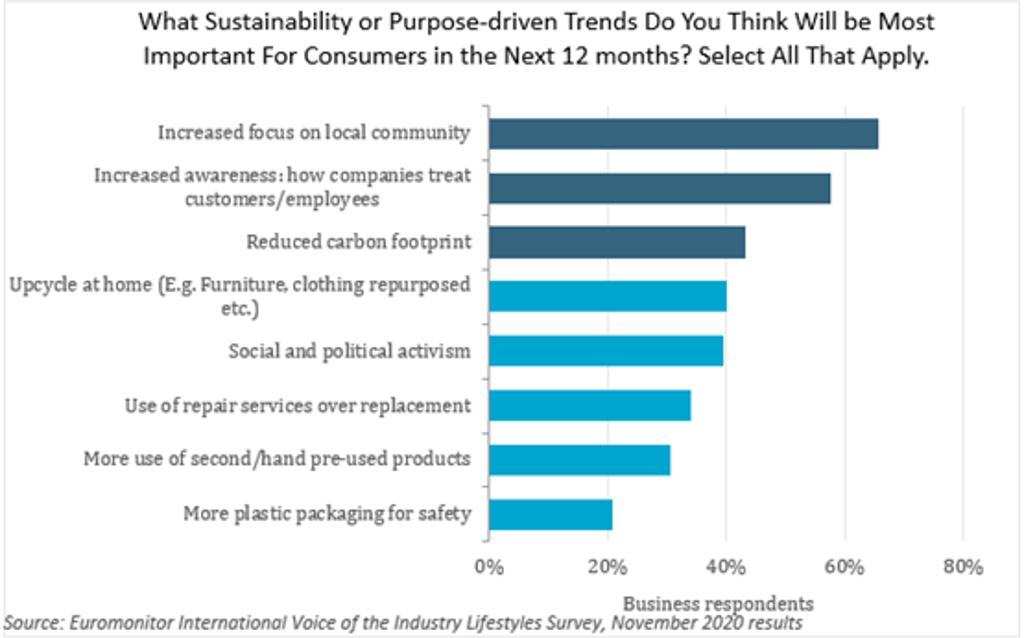Why is ESG important for companies?
Environmental, social, and corporate governance (ESG) has entered the corporate lexicon and investors are holding CEOs accountable for ESG targets. According to Euromonitor International’s Sustainability Survey, 2020, CEOs are increasingly the driver of corporate sustainability and are responsible for communicating with their key stakeholders.
This is important as consumers are buying from companies that share their ESG targets and are not shy in holding companies accountable for any deviation from core strategies. Traditionally, sustainability was viewed as a cost to the bottom line that was to be reduced. However, this has changed, and CEOs are seeing sustainability as a competitive advantage.
Electrolux’s CEO, Jonas Samuelson is quoted in Electrolux’s 2021 Sustainability report:
“I firmly believe that our framework will help us maintain our sustainability leadership, which will be a competitive advantage and driver of profitable growth over the next decade.”

Domestic sustainability comes into focus
As sustainability, and in particular environmental sustainability, comes into focus, residential homes are under increasing scrutiny. According to Climate Watch, the residential sector (10.9%) is one of the largest emitters of greenhouse gases in 2016 (latest available data). With the “do everything from home” trend possibly extending much further into the future, emissions will only increase. To ensure a sustainable future, efforts need to start at home.
In addition to the traditional areas of sustainability - energy efficiency, materials, and waste recycling - there three emerging areas that are gaining greater attention; food waste, water recovery, and modularity and repair.
These three aspects are coming into focus mainly due to the culture of excessive consumption. This culture is leading to consumers indulging in bigger houses, fast fashion clothes, the latest gadgets, and overconsumption of food. Not only are consumers buying more, but they are also disposing of more with increasing frequency. Moreover, a greater amount of time spent at home is also leading to a larger carbon footprint.
Euromonitor International discusses the importance of the six areas of domestic sustainability’s future as well as what companies are doing to help reduce residential home GHG emissions in the briefing.

Takeaway for businesses
The focus on sustainability will need to be sustained in the long-term. The pandemic’s impact on the supply chain has shown that the era of excess is over, and that there is a greater need to be prudent with the earth’s resources. For businesses, the key takeaways from each of the six key aspects will be significant and will require a rethink of corporate strategies.
Energy prices will only increase
- Underinvestment in oil and gas assets has led to a supply crunch even as global economies reopen.
- While there is a long-term shift towards renewable energy, the short- to medium-term will still involve increased used of fossil fuel with rising prices.
- This will make more expensive but energy-efficient appliances more practical for a higher number of consumers.
Scarcity of commodities
- Consumers spending prolonged time at home are purchasing more goods compared to services.
- This is leading to a global shortage of key commodities and significantly higher prices if available.
- Innovation in metal replacement and lightweighting technologies will be key to keeping appliance prices down.
Annual e-waste weighs more than total number of commercial airliners ever produced
- E-waste is and will remain a significant challenge as recycling e-waste is currently an unprofitable venture.
- Until this happens, government regulations and mandates will require manufacturers to be responsible for the e-waste they create.
One third of all food produced goes to waste
- Global food loss and waste contributes to 8% of GHG emissions, equivalent to 87% of road transport emissions.
- Most food waste occurs at the consumer stage of the food journey.
- Better meal planning, storage conditions, and meal portion planning will help alleviate this.
Water saving to water recovery
- As appliances reach the limits of physics in terms of water saving technology, water recovery will come into focus.
- Water recovery is crucial as governments realise that subsidising water processing is not practical in the long-term as it leads to wastage and continued use of less efficient appliances.
The Right to Repair movement takes off
- 2021 was a milestone year for the movement as both the EU and US signalled a renewed focus.
- Tackling the global e-waste challenge starts by enabling consumers to repair their own devices at competitive prices.
- A focus on repair and reuse will benefit both consumers and manufacturers.
Reach out to Industry Manager Tim Chuah to understand how this will affect your company.
